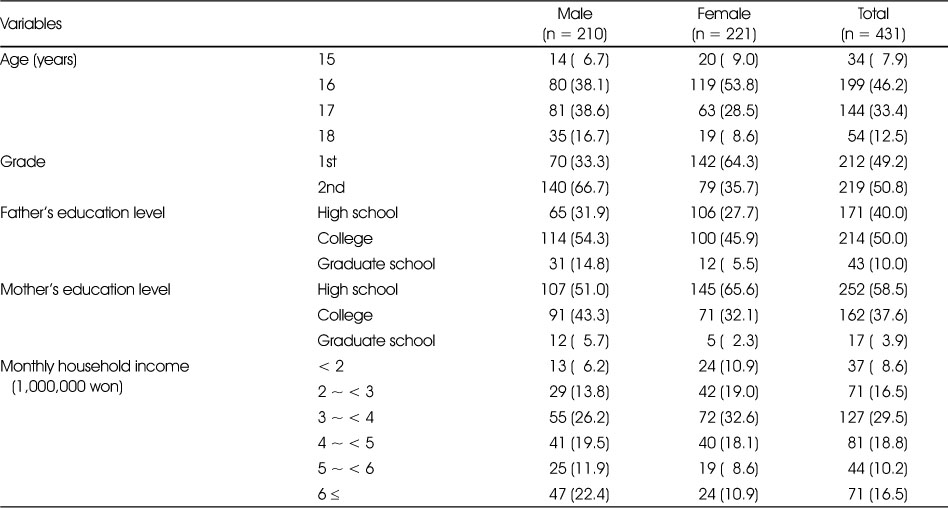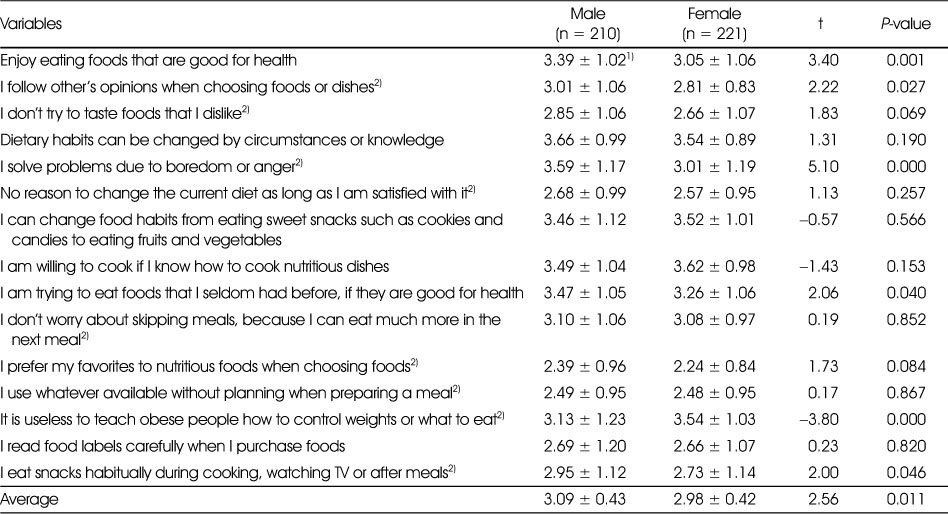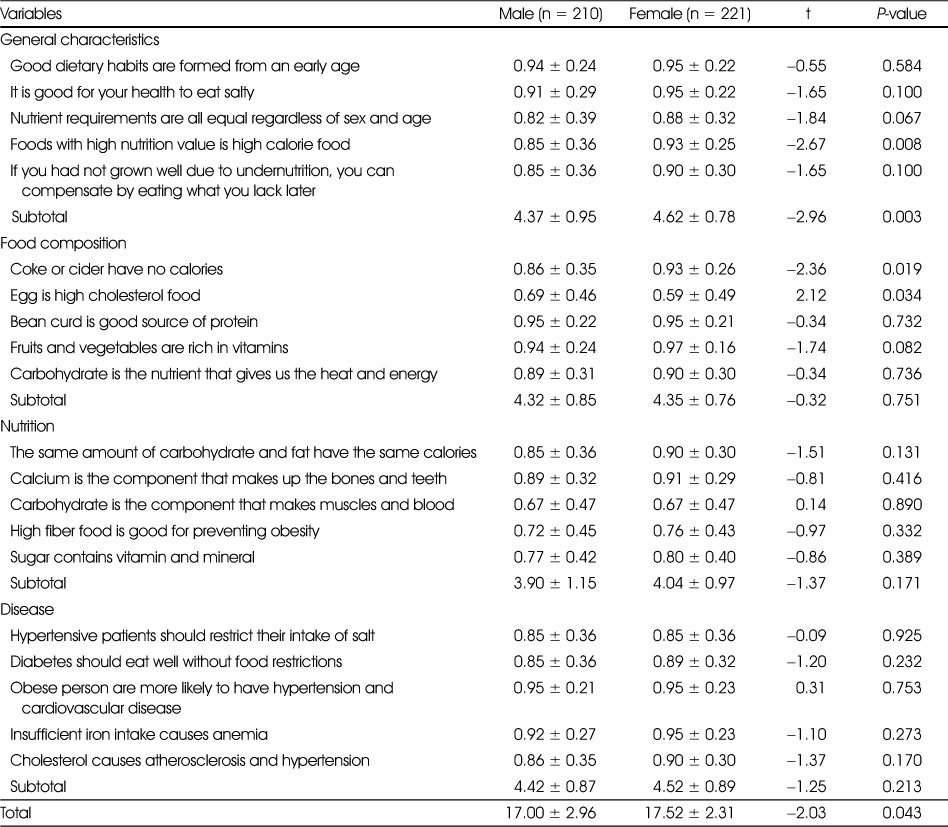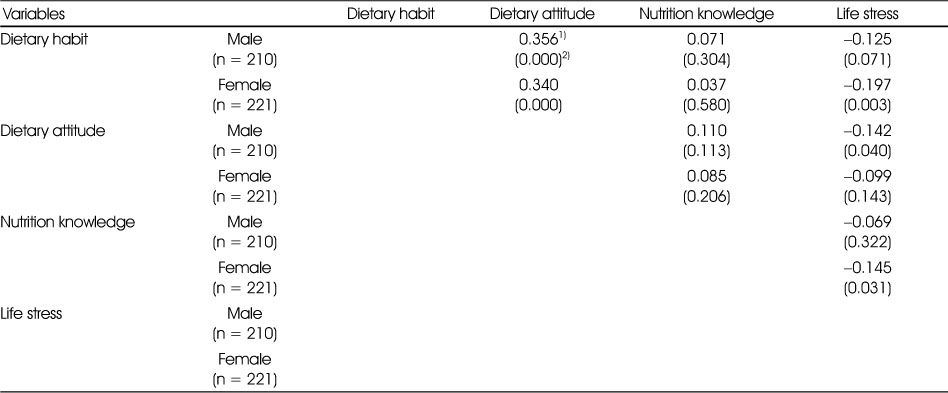Articles
- Page Path
- HOME > Korean J Community Nutr > Volume 25(2); 2020 > Article
- Research Article
- Relationship between Dietary Habits, Life Stress and Nutrition Knowledge of High School Students in Gyeonggi Area
- Kyung Ae Park, Hongmie Lee, Kyunghee Song
-
Korean Journal of Community Nutrition 2020;25(2):126-136.
DOI: https://doi.org/10.5720/kjcn.2020.25.2.126
Published online: April 30, 2020
2Department of Food Science and Nutrition, Daejin University, Pocheon, Korea, Professor
3Department of Food and Nutrition, Myongji University, Yongin, Korea, Professor
-
Corresponding author:
Kyunghee Song,
Email: khsong@mju.ac.kr
- 1,142 Views
- 22 Download
- 2 Crossref
- 0 Scopus
Abstract
Objectives
This study was performed to examine dietary habits, life stress, and nutrition knowledge among high school students in Gyeonggi area.
Methods
A total of 431 high school students (210 males, 221 females) in Gyeonggi area participated in this study from November to December of 2011. The study was a questionnaire-based survey that included dietary habits, dietary attitudes, life stress, and nutrition knowledge.
Results
Body weight, height, and body mass index were all higher in male students than in female students (P < 0.001, respectively). For dietary habits, the average score (P < 0.01) and scores for considering combination of food groups (P < 0.05), eating green and orange vegetables (P < 0.05), eating meat, fish, eggs, or beans everyday (P < 0.05), drinking milk (P < 0.001), and eating seaweed (P < 0.01) were higher in male students than in female students. For dietary attitudes, the average score (P < 0.05) and scores for the five items were significantly different between male and female students. Male students showed a significantly lower nutrition knowledge score than female students (P < 0.05). Life stress score of students largely was attributable to academic factors, and female students showed higher stress score for academic, personal, and surrounding environmental (P < 0.05, respectively) factors than male students. Dietary habit score (P < 0.01) and nutrition knowledge score (P < 0.05) in female students as well as dietary attitude score (P < 0.05) in male students were negatively correlated with life stress score. Dietary habit scores in male and female students were positively correlated with dietary attitude score (P < 0.01, respectively). Need for nutrition education was significantly higher in female students than in male students (P < 0.05).
Conclusions
This study provides basic information on dietary habits, dietary attitudes, life stress, and nutrition knowledge according to sex and suggests gender-specific practical nutrition education programs to address undesirable dietary habits and attitudes in students with higher stress levels.
Published online Apr 30, 2020.
https://doi.org/10.5720/kjcn.2020.25.2.126
Relationship between Dietary Habits, Life Stress and Nutrition Knowledge of High School Students in Gyeonggi Area
Abstract
Objectives
This study was performed to examine dietary habits, life stress, and nutrition knowledge among high school students in Gyeonggi area.
Methods
A total of 431 high school students (210 males, 221 females) in Gyeonggi area participated in this study from November to December of 2011. The study was a questionnaire-based survey that included dietary habits, dietary attitudes, life stress, and nutrition knowledge.
Results
Body weight, height, and body mass index were all higher in male students than in female students (P < 0.001, respectively). For dietary habits, the average score (P < 0.01) and scores for considering combination of food groups (P < 0.05), eating green and orange vegetables (P < 0.05), eating meat, fish, eggs, or beans everyday (P < 0.05), drinking milk (P < 0.001), and eating seaweed (P < 0.01) were higher in male students than in female students. For dietary attitudes, the average score (P < 0.05) and scores for the five items were significantly different between male and female students. Male students showed a significantly lower nutrition knowledge score than female students (P < 0.05). Life stress score of students largely was attributable to academic factors, and female students showed higher stress score for academic, personal, and surrounding environmental (P < 0.05, respectively) factors than male students. Dietary habit score (P < 0.01) and nutrition knowledge score (P < 0.05) in female students as well as dietary attitude score (P < 0.05) in male students were negatively correlated with life stress score. Dietary habit scores in male and female students were positively correlated with dietary attitude score (P < 0.01, respectively). Need for nutrition education was significantly higher in female students than in male students (P < 0.05).
Conclusions
This study provides basic information on dietary habits, dietary attitudes, life stress, and nutrition knowledge according to sex and suggests gender-specific practical nutrition education programs to address undesirable dietary habits and attitudes in students with higher stress levels.
Table 1
General characteristics of high school students by sex
Table 2
Height, weight and body mass index of high school students by sex
Table 3
Dietary habit score of high school students by sex
Table 4
Dietary attitude score of high school students by sex
Table 5
Nutrition knowledge score of high school students by sex
Table 6
Life stress score of high school students by sex
Table 7
Correlation among dietary habit, dietary attitude, nutrition knowledge and life stress of high school students
Table 8
Nutrition information sources and need for nutrition education of high school students by sex
References
-
Song YJ, Joung HJ, Kim YN, Paik HY. The physical development and dietary intake for Korean children and adolescents: Body composition and obesity prevalence. Korean J Nutr 2006;39(1):44–49.
-
-
Park HS, Jung NH. A study on snack intake behavior by the stress level of high school students in Jeonnam area. J Korean Home Econ Educ Assoc 2018;30(4):141–164.
-
-
Han SY. A study of relationship among physical symptoms, mental health according to stress factors of middle school students. J Korea Acad Ind Coop Soc 2012;13(12):5800–5807.
-
-
Oh GS. The school related stress and the need of mental health education among high school students. J Korean Acad Community Health Nurs 2007;18(2):320–330.
-
-
Ministry of Health and Welfare. Korea national health and nutrition examination survey 2018 [Internet]. Ministry of Health and Welfare; 2019 [cited 2020 Feb 12].Available from: https://www.cdc.go.kr/board/board.es?mid=a20602010000&bid=0034&list_
no=366791&act=view.
-
-
Jung SK. Psychosocial understand of the stress. Psychosom Med 2001;9(1):66–77.
-
-
Casey BJ, Jones RM, Levita L, Libby L, Pattwell S, Ruberry E. The storm and stress of adolescence: Insights from human imaging and mouse genetics. Dev Psychobiol 2010;52(3):225–235.
-
-
Chung IJ, Park JY, Kim EY. Factors predicting suicidal ideation and suicidal attempts of school youth and out-of-school youth. Ment Heal Soc Work 2010;34(1):222–251.
-
-
Sim KH, Kim SA. Utilization state of fast foods among Korean youth in big cities. Korean J Nutr 1993;26(6):804–811.
-
-
Doo SR, Lee YM, Park HR, Song KH. Relationship among life stress, dietary behaviors and high-fat snack intake in high school students in Gyeonggi area. Korean J Community Nutr 2017;22(4):289–297.
-
-
Hong JH, Kim SY. Correlation between eating behavior and stress level in high school students. J Korean Soc Food Sci Nutr 2014;43(4):459–470.
-
-
Park YH, Lee JY, Jeong E, Kim BH. A comparative analysis of eating habits of female middle school students in Gangwondo, Korea, according to stress levels. Korean J Community Living Sci 2015;26(3):565–573.
-
-
Kim KH, Cho HS. Snacking behaviors and depression in middle school students in Jeonnam area. Korean J Food Culture 2014;29(5):373–379.
-
-
Lee JS. The effects of gender, obesity rate, nutrition knowledge and dietary attitude on the dietary self-efficacy of adolescents. Korean J Community Nutr 2003;8(5):652–657.
-
-
Erdenebileg Z, Park SH, Park SJ, Chang KJ. Nutrition knowledge, dietary attitudes and dietary behaviors by gender of high school students in Incheon. J Korean Soc Food Cult 2016;31(6):652–660.
-
-
Eom HS, Jeong MJ, Kim SB. A study on nutrition knowledge, dietary attitude, food habit of middle school students in Chonbuk area. Korean J Community Nutr 2005;10(5):574–581.
-
-
Jeong KJ, Lee JH, Kim MH. A study on the nutrition knowledge, dietary behaviors, and dietary habits according to the gender in high school students in Chungnam area. Korean J Food & Nutr 2014;27(3):458–469.
-
-
Park HY, Hyun HJ, Song KH. Nutrition knowledge, attitudes, and dietary habits of physical education majors and non-majors of male college students. Korean J Community Nutr 2009;14(4):363–373.
-
-
Kim SY, Lee HM, Song KH. Body image recognition and dietary behaviors of college students according to the body mass index. Korean J Community Nutr 2007;12(1):3–12.
-
-
Kim KH, Chon KK. Development of life stress and coping scale for junior high school students. Korean J Clin Psychol 1993;12(2):197–217.
-
-
Park SH, Kim HO, Park KS. Eating behavior, physical activities and obesity degree of adolescents in a region of Jeonbuk province. J Korean Soc Sch Health 2007;20(2):23–33.
-
-
Choe JS, Chun HK, Chung GJ, Nam HJ. Relations between the dietary habit and academic achievement, subjective health judgement, physical status of high school students. J Korean Soc Food Sci Nutr 2003;32(4):627–635.
-
-
Park HK, Hong H, Lee JS, Kim JY. A study on the dietary habits and health consciousness of high school students in Seoul. Korean J Nutr 2010;43(4):395–403.
-
-
Kim MH. Eating habits, self perception of body image and weight control behavior by gender in Korean adolescents: Using data from a 2010 Korea youth risk behavior web-based survey. J East Asian Soc Dietary Life 2012;22(6):720–733.
-
-
Han MJ, Cho HA. The food habit and stress scores of high school students in Seoul area. Korean J Soc Food Sci 2000;16(1):84–90.
-
-
Kim BR, Kim YM. A study on the food habits and the evaluation of nutrient intakes of high school students in Chuncheon. Korean Home Econ Educ Assoc 2005;7(3):35–52.
-
-
Kouzma NM, Kennedy GA. Homework, stress, and mood disturbance in senior high school students. Psychol Rep 2002;91(1):126–130.
-
-
Seo YJ, Kim MH, Kim MH, Choi MK. Status and relationships among lifestyle, food habits and stress scores of adults in Chungnam. Korean J Community Nutr 2012;17(5):579–588.
-
-
Song DB, Seo DH, Park HB, Ahn SG, Sun SM, Park EC. The relationship between stress and eating habits of university students. J Korean Acad Fam Med 2006;27(1):7–11.
-
-
Kim BR. A study on nutrition knowledge, dietary habits, healthrelated life style and health condition of college students in Chuncheon. J Korean Soc Food Sci Nutr 2006;35(9):1215–1223.
-
-
Lee SW, Sung CJ, Kim AJ, Kim MH. A study on nutritional attitude, food behavior and nutritional status according to nutrition knowledge of Korean middle school students. Korean J Community Nutr 2000;5(3):419–431.
-
-
Rhie SG, Jun JS. Dietary and health behaviors and nutrition education environments of high school students in Gwangmyeong, Gyeonggi province. Korean J Community Living Sci 2015;26(2):287–301.
-

 KSCN
KSCN









 Cite
Cite


